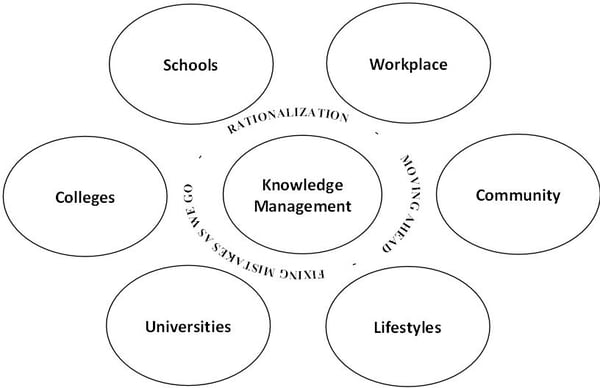Published on
Knowledge Management As A Model For Education

We need a practical model for education. Current education models are essentially abstract. Let me explain what I mean. Education is about learning, but it is not conducted on the basis of the way learning works. Why not? The answer is that we don’t know how learning works. All learning theories are abstract. That is, they are abstract statements defined by other abstract statements. Consequently, the applications of learning theories are discretionary and can be used to rationalize just about anything. In my previous article, “Innovation in Education” I explained how conventional education is based on the acquisition of knowledge. This model is rationalized by abstract theory.
The Drawback of Conventional Education
It is important to understand that abstract educational models are not necessarily bad. They obviously work because there are so many educated people. So there is a place for them. However, there is a major drawback. Conventional education models do not work for everyone and blaming the victim can be easily rationalized using abstract theory when education does not work.
An Alternative Education System
In contrast to conventional education, an alternative education system would be based on knowledge management and rationalized by a practical learning theory based in a natural learning process. This practical learning theory can be used to build an alternative education system that transcends diversity and creates equal opportunity of learning for everyone. The system would be based on knowledge management and used to rationalize the design of programs, the development of curriculum and the facilitation of learning. It would also provide the basis for a practical teacher training program to provide teachers with clearly defined professional teaching competencies.
The Natural Learning Process
The practical theory describes the natural learning process as accessing information, valuing knowledge, expressing ideas, building language, gaining perspective, garnering attitude, planning strategies, manipulating resources and assessing quality. The learning process is used at five levels of knowledge management – building knowledge, using knowledge, organizing knowledge, personalizing knowledge and teaching knowledge. Even if we have never heard of those processes and levels, we all use them. We go through the process and levels when we learn in the real world, and we can identify everything we learn at each level of knowledge and some part of the process. It is natural learning and it is inherent in everything we do.
Building Confidence as the Central Focus of Education
This practical theory is designed to create awareness of natural ability and build confidence in learning. When learners consciously and repetitively use the nine element learning process to attain each level of knowledge, they inherently become aware of the process itself. In the beginning, they are conscious of the steps, but eventually it becomes a matter course. It helps create a systematic way of thinking about learning and managing knowledge.
At the initial knowledge building level, confidence is low because learners have to depend on others directly or indirectly to make the process work. At the using knowledge level, confidence increases because learners have enough knowledge to use the processes to do things on their own while still learning. At the organization level, learners become more confident because they are integrating new knowledge with similar things they already know. At the personalization level, confidence improves even more as they integrate all the various things that they know. This is the level of emotional control where they stand and say “look at how much I know” and “look at what I can do”. At the teaching knowledge level, confidence becomes solid as they rise above emotion and look objectively at what there is to know and what they want to know. This level can also be called the self-directed learning level because we can use it to facilitate our own learning.
A Knowledge Management Education Model
In knowledge management education, people will understand knowledge itself. Learning becomes a dynamic, multidimensional, integrated, interactive process and knowledge is managed efficiently and effectively in school, in college and university, on the job, in our personal lives and in the community. Education based on a practical theory will become infinitely less controversial than education based on abstract theory. Debate over education as a true profession will cease to exist.
Lots More to Come
I will write a series of articles over the next few weeks to provide more detail of the theory, how it is used to manage knowledge, and how I believe it can be linked to brain development. Also, I would be happy to integrate responds to questions and comments as integral parts of articles as I write them.
Author Perspective: Business



